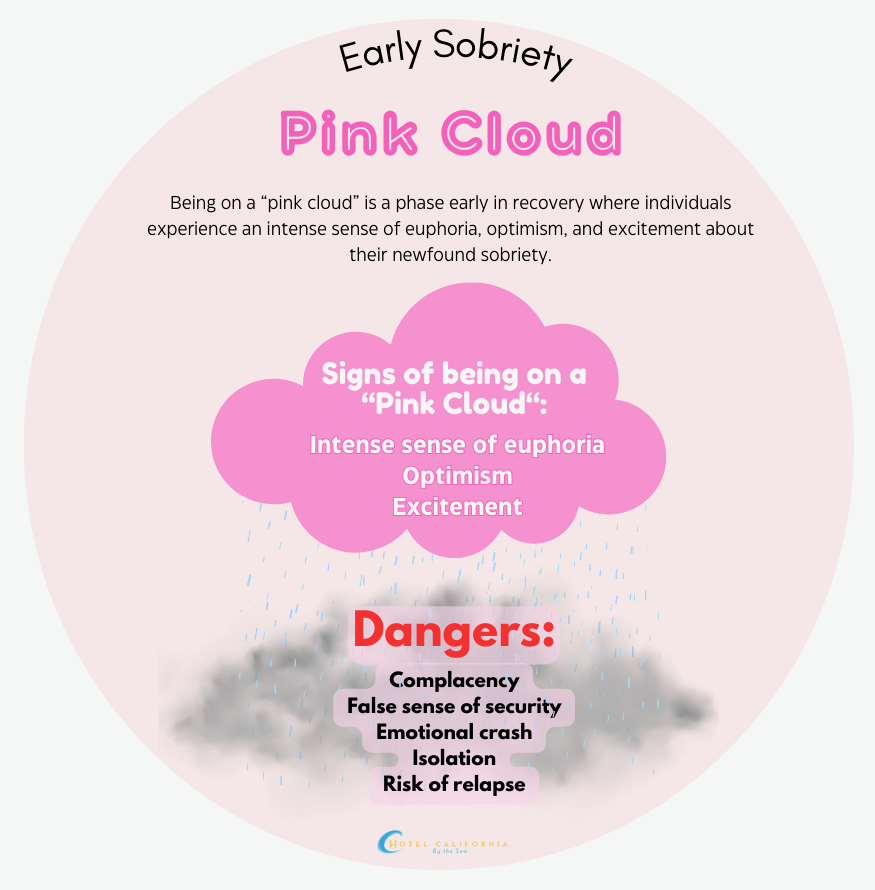Pink Cloud Syndrome
In the early days of addiction recovery when you have cleared your mind and body from mind-altering substances, many people feel a sense of elation and joy to finally be free from the hold of addiction. This feeling is often referred to as the pink cloud syndrome. Pink cloud syndrome describes a state of mind in which a person experiences feelings of euphoria and that nothing can go wrong now that they are sober. They feel like they have been changed, have a more positive outlook on life and have been “cured” of their addiction.

Some refer to this as looking at life through rose-colored glasses or it can be described as feeling “high on life.” The term pink cloud syndrome was first coined by Alcoholics Anonymous to described the shorted lived honeymoon phase of recovery after alcohol detox and withdrawal. Soon after it was adopted into other forms of drug recovery to describe those same feelings of relief and happiness a person experiences during the early stages of recovery.
When someone is experiencing a pink cloud, meaning they are experiencing a newfound sense of self-confidence, they begin to feel excited about their sober journey. The rush of euphoria and positivity that was suppressed for so long during addiction has now come back and the person feels they can now live life without hurdles or further treatment for their addiction. The pink cloud syndrome can have both positive and negative effects on addiction recovery.
How do you know you are experiencing Pink Cloud Syndrome?
- You experience feelings of euphoria and extreme joy
- You have a newfound hopeful outlook on recovery and life
- You feel a sense of positivity and optimism about recovery
- You are in a calm and peaceful state of mind
- You are now confident in your ability to maintain sobriety
- You are preoccupied with the positive aspects of sobriety
- You are not committed to positive and effective lifestyle changes
- You have an increased emotional awareness
- You feel like you are floating on a cloud and have not given too much thought about ordinary life and reality
- You have an increased sense of self-esteem and relief from the physical pain felt by addiction
- You have an elevated mood and increased energy levels
- You are eager to reestablish relationships and get back into daily activities
- You have a newfound motivation for everyday tasks
- You are optimistic about the future
- You have an increased engagement with your recovery and have joined addiction support groups such as AA or SMART
Not everyone experiences the pink cloud syndrome. The symptoms and duration of the phase of recovery is dependent on the individual. But when they do, it is often after drug detox and withdrawal symptoms have subsided. It can also begin once the symptoms have been managed with medication. It can last anywhere from several weeks to months and is dependent on the individual. During this period of recovery, users are able to get back in touch with their emotions that were once dulled during addiction. It provides the user with a different perspective shift away from the negativity and stress associated with their addiction.

The drawbacks and negative effects of Pink Cloud Syndrome
- This stage of recovery can cause a sense of dangerous overconfidence about the sobriety journey
- This stage of recovery can make a person believe they are cured of their addiction
- This stage of recovery can promote unrealistic expectations for recovery treatment
- This stage of recovery can cause a person to be less motivated to learn effective coping skills or implement them because they believe they will never experience cravings or relapse now that they are sober
- This stage of recovery can make a person believe they will no longer face hurdles or struggles with their addiction and sobriety
- When individuals believe they no longer need treatment, it can put them at risk for relapse when things begin to get difficult or stressful
- This stage of recovery can bring about feelings of detachment from reality
- This stage of recovery can provide unrealistic expectations
- This stage of recovery can make people believe they no longer need the help of addiction support groups such as AA or supportive treatments such as medication management and therapy
- This stage of recovery can promote a lack of preparedness for hardships and difficulties such as cravings, triggering events and other factors that can jeopardize your sobriety
- This stage of recovery prevents you from learning the tools you need to manage your emotions when you hit a low point in your sobriety journey
- This stage of recovery can raise the risk of unhealthy behaviors that can lead to relapse
Check Your Insurance Coverage for FREE
Find out if your insurance covers addiction treatment in minutes. We accept most insurance!
What happens when Pink Cloud Syndrome wears off?
Experiencing pink cloud syndrome can sometimes make people forget that recovery is in fact a lifelong process. It is not a one-time deal. Once the feelings of joy and elation in the early stages of recovery wear off, the real work to maintain sobriety can be daunting and difficult for many. Recovering addicts will return to a life of responsibilities and daily triggers, which if they have not learned to manage or cope with, can send them to relapse back into old habits of addiction.
Even the thought of this can be overwhelming and deter some from sobriety. A 2011 study found that about 85% of addicts relapse within the first year of their sobriety. In some cases, once the pink cloud syndrome phase has passed, users can experience post-acute withdrawal syndrome (PAWS). PAWS most often occurs with those who experience severe alcohol addiction. It is a condition in which withdrawal symptoms may continue long after sobriety has been achieved. Common symptoms of PAWS include difficulty concentrating, memory issues, sleep problems, fatigue, sensitivity to stressful situations, depression, anxiety and mood swings.
How to manage past Pink Cloud Syndrome
During the pink cloud syndrome phase, life may seem like rainbows and unicorns. However, once the phase has passed, some may feel unprepared to face the reality of their recovery journey. There are ways to help keep the sobriety momentum going past the initial euphoria and elation of finally having a clear body and mind. Individuals should focus on working towards and achieving small and management goals. Educate and inform yourself of the tools and resources you may need to help you maintain sobriety. This includes learning basic coping skills and coming up with a plan of action when distressing events arise. See a mental health professional. You can also seek out other long-term recovery support groups to help keep yourself accountable in recovery and build a solid support system.
Reach out to Hotel California by the Sea
We specialize in treating addiction and other co-occurring disorders, such as PTSD. Our Admissions specialists are available to walk you through the best options for treating your addiction.
Treatment for Substance and Alcohol Use Disorder
Pink cloud syndrome can give addicts motivation to engage in the positive aspects of recovery and allow them to manifest a better outlook on life. However, this honeymoon phase is short-lived and if not followed up by the necessary work needed to maintain sobriety, can lead to relapse. The recovery process involves finding a healthy emotional balance that can change between drama and euphoria. Learning effective ways to cope with distressing emotions can help individuals maintain long-term recovery. Professional behavioral health programs such as Hotel California by the Sea provide addicts with the tools and resources they need to maintain sobriety.
We offer detox, inpatient residential, PHP and IOP. Our programs include evidence-based treatment methods such as CBT, DBT and family therapy. Clients can participate in a combination of medication treatment plans, individual counseling sessions and group therapy. Hotel California by the Sea believes in a holistic approach to substance addiction treatment and is dedicated to helping clients at all levels of addiction and recovery.
References:
https://www.healthline.com/health/pink-cloud
https://www.forbes.com/health/conditions/pink-cloud
https://iamsober.com/en/blog/pink-cloud-of-recovery
https://sober.com/getting-past-the-pink-cloud
https://addictionresource.com/treatment/pink-cloud-syndrome
